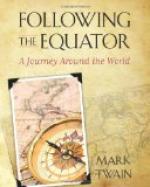Fifty Indians and Chinamen asleep in a big tent in the waist of the ship forward; they lie side by side with no space between; the former wrapped up, head and all, as in the Indian streets, the Chinamen uncovered; the lamp and things for opium smoking in the center.
A passenger said it was ten 2-ton truck loads of dynamite that lately exploded at Johannesburg. Hundreds killed; he doesn’t know how many; limbs picked up for miles around. Glass shattered, and roofs swept away or collapsed 200 yards off; fragment of iron flung three and a half miles.
It occurred at 3 p.m.; at 6, L65,000 had been subscribed. When this passenger left, L35,000 had been voted by city and state governments and L100,000 by citizens and business corporations. When news of the disaster was telephoned to the Exchange L35,000 were subscribed in the first five minutes. Subscribing was still going on when he left; the papers had ceased the names, only the amounts—too many names; not enough room. L100,000 subscribed by companies and citizens; if this is true, it must be what they call in Australia “a record”—the biggest instance of a spontaneous outpour for charity in history, considering the size of the population it was drawn from, $8 or $10 for each white resident, babies at the breast included.
Monday, May 4. Steaming slowly in the stupendous Delagoa Bay, its dim arms stretching far away and disappearing on both sides. It could furnish plenty of room for all the ships in the world, but it is shoal. The lead has given us 3 1/2 fathoms several times and we are drawing that, lacking 6 inches.
A bold headland—precipitous wall, 150 feet high, very strong, red color, stretching a mile or so. A man said it was Portuguese blood—battle fought here with the natives last year. I think this doubtful. Pretty cluster of houses on the tableland above the red-and rolling stretches of grass and groups of trees, like England.
The Portuguese have the railroad (one passenger train a day) to the border—70 miles—then the Netherlands Company have it. Thousands of tons of freight on the shore—no cover. This is Portuguese allover —indolence, piousness, poverty, impotence.
Crews of small boats and tugs, all jet black woolly heads and very muscular.
Winter. The South African winter is just beginning now, but nobody but an expert can tell it from summer. However, I am tired of summer; we have had it unbroken for eleven months. We spent the afternoon on shore, Delagoa Bay. A small town—no sights. No carriages. Three ’rickshas, but we couldn’t get them—apparently private. These Portuguese are a rich brown, like some of the Indians. Some of the blacks have the long horse beads and very long chins of the negroes of the picture books; but most of them are exactly like the negroes of our Southern States round faces, flat noses, good-natured, and easy laughers.
Flocks of black women passed along, carrying outrageously heavy bags of freight on their heads. The quiver of their leg as the foot was planted and the strain exhibited by their bodies showed what a tax upon their strength the load was. They were stevedores and doing full stevedores work. They were very erect when unladden—from carrying heavy loads on their heads—just like the Indian women. It gives them a proud fine carriage.




